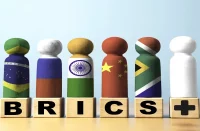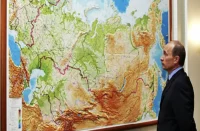On Monday January 30, 2012 a leading Russian TV channel showed an unexpectedly significant interview with Michael McFaul, the recently appointed US Ambassador to Russia. Why ‘unexpectedly’? Because the host of the show was Vladimir Pozner, patriarch of the Soviet/Russian television widely known for his pro-Western, liberal and hedonistic stance. We expected a regular one-way street scoring Russian non-compliances with the ‘universal democratic values’ and discussing the perspectives of normalization of the Russian political system. What we actually watched was a brilliant example of professional journalist performance exposing hot bilateral issues in an unvarnished way. The US Ambassador eventually faded into a confused, excusing and lost position.
A few words about the background. Amb. McFaul is not a career US diplomat. If he excels in delivering his credentials to the Russian President, he will be only second US Ambassador to USSR/Russia not proceeding from the State Department (the first one was Robert Strauss, who witnessed the transition from Soviet Union to Russia in 1991-1992). Being a Professor of Stanford University (Slavic and Eastern European Studies) Mr. McFaul published numerous research books on Russian internal policies and democratic transitions worldwide, used to lecture his students on the state of Russian affairs under the tsars, and the US Congressmen – on the state of Russian affairs under Pres. Putin. During the latter he was neither diplomatic nor merely polite commenting the following thesis of Putin’s speech at the Victory parade in May 2007: ‘The number of threats is not decreasing. They are only transforming and changing the guise. As during the Third Reich era, these new threats show the same contempt for human life and claims to world exclusiveness and diktat.’ Mr. McFaul standing in front of the US Congress Committee on Foreign Affairs assessed Putin’s phrase this way:
These are not the words of a pragmatic realist, seeking to do deals with American and European leaders. These are the words of a paranoid leader, who seems to need external enemies as a means for creating domestic legitimacy.
He apparently did not make an assumption that Putin was actually talking about international terrorism… And he did not figure out that less than in 5 years he would have to work with Putin’s administration as a new US envoy in Moscow…
Nevertheless until recently Mr. McFaul worked for the U.S. National Security Council as Special Assistant to President Obama and Senior Director of Russian and Eurasian Affairs. He is believed to be one of the leading American experts on Russia and architect of notorious ‘Reset’ under the incumbent administration. He speaks some Russian and considers himself ‘a specialist on democracy, anti-dictatorial movements and revolutions’. Such promising presentation has fostered unprecedented hopes among particular Russian opposition circles and notable anxiety at the patriotic camp.
He arrived in Moscow on Saturday, January 14, 2012. On Tuesday, January 17, the second working day in office, he invited a few leaders of the Russian ‘system’ and ‘non-system’ opposition to the Embassy in order, as it was widely perceived by the majority of the Russian civil society, ‘to give them instructions and funding’. A video footage (in Russian) on the oppositionists arriving and zombie-like departing from the US Embassy caused a dramatic scandal in the Russian media. A few days later he came to Pozner studio at the 1 TV Channel.
The first bell rang when Pozner asked him:
‘On the second day of your stay in Moscow you met with the representatives of non-system opposition. That is your right. But you couldn’t be unaware of the fact that it would cause a reaction and will be interpreted as a certain signal. If so, what exactly did you intend to signal? And if you presumed such reaction, why didn’t you appoint the meeting say 2-3 weeks later? You came to relieve the tension, but this act, on the contrary, pumped it up!’
It took Ambassador some effort to choose a language for reply:
‘Well, when I come to Moscow it did not depend on me. It depended on the American Senate. We were planning to come in August to insert children in school before the school-year starts… Some in the US Senate are worried that when I come to Moscow, I’ll tell you and the watchers about the secrets of our Missile Defense System in Europe. So I came in January because of the US Senate. This is the first fact… The second fact. On my first day I was suddenly to accompany Deputy Secretary of State William Burns… It was a bang because do you know who I met that day? I even put it down in order everyone knows who I met that day: Sergey Lavrov, Russian Foreign Minister, Sergey Ivanov, Chief of the Presidential Administration,… (names a handful of other Russian officials).’
 Pozner interrupts him: ‘Did you meet them or Mr. Burns’?
Pozner interrupts him: ‘Did you meet them or Mr. Burns’?
McFaul: ‘Oh, thank you for reminding. This is very important. We met together with him all these people… This is a standard politics in my country. First day we meet with the governmental officials, the second with the opposition….’
Pozner: ‘My question actually is about timing. Look, when President comes for two days and meets opposition on the second, it is Ok, he won’t have another chance. But you came not for two days, do you agree? So if Mr. Burnes’ visit weren’t the case, would you appoint that meeting with the opposition on the second day or just postpone it understanding that it would cause a negative reaction?’
McFaul: ‘If’ and ‘were’ are terrible questions, I won’t answer…. But if I weren’t accompanying Mr. Burnes on that meeting, it would be a violation of diplomatic protocol…
Pozner’s face showed decisiveness. He started bombarding Amb. McFaul with increasingly tough questions:
‘How do you understand the Russian particularity (is it a case at all in your view?) and how do you understand your mandate?’
‘How are you going to build personal relations with the most likely future President Vladimir Putin whom you repeatedly depicted in numerous articles as an autocrat and an enemy of freedom? Say in 2000 you wrote an article where you compared Putin with Milosevic…’ (see e.g. Prepared Statement of Dr. Michael McFaul `Russia’s 2000 Presidential Elections: Implications For Russian Democracy And U.S.-Russian Relations’ presented on the hearings before the Subcommittee on European Affairs, US Senate, April 12, 2000 – OR).
 ‘Are you seriously stating that in the United States the Cold War mentality has been already off years ago? I’ve been to America quite recently. We were making a documentary. I met hundreds of Americans. I assure you that the Cold War has impacted them not less than the Russians. Even taking note of their reaction on the word ‘Russia’… Read American school textbooks on history. What? Ah, American students do not read textbooks? Well, listen to McCain. Listen to Gingrich. Is the Cold War over for them?
‘Are you seriously stating that in the United States the Cold War mentality has been already off years ago? I’ve been to America quite recently. We were making a documentary. I met hundreds of Americans. I assure you that the Cold War has impacted them not less than the Russians. Even taking note of their reaction on the word ‘Russia’… Read American school textbooks on history. What? Ah, American students do not read textbooks? Well, listen to McCain. Listen to Gingrich. Is the Cold War over for them?
‘Do you really think that fighting in Iraq and in Afghanistan the US soldiers defend America?’
‘Are you going to finance Russian opposition the same way as you did in Ukraine during Orange revolution?’ And after the Ambassador did not find anything better than to outcry in Russian: ‘This is not truth! This is an insult!’ continued: ‘In a document of the Stanford University it was said that in 1988 you advanced so far that had assisted to the members of a group named ‘Democratic Russia’ to establish contacts with the Western agencies and foundations that gave them funding to support their activities. This is the first fact. Now, in your book ‘Revolution in Orange’ (2006) you conclude that the victory of Victor Yuschenko was secured mainly thanks to intensive work with the Ukrainian youth at the expense of American funding, totaled 18 million USD. This is the second fact. So how do you think, don’t we have some reasons to suspect that American money might be invested in a revolution here in Russia as well?
‘No, we are not talking about such things (seconds before the Ambassador was comparing American funding of anti-governmental protests worldwide to the Russian financing of the Fort Ross restoration program in California). We are talking about American subversive, clandestine actions…’
‘Once upon a time Condolisa Rice told about Georgian president Mikhail Saakashvili ‘our golden boy’. Please look at the screen. (A photo of Alexey Navalny, a prominent Russian blogger and social activist, Yale University graduate and one of the harshest critics of ‘Putin’s regime’ appears in studio.) Isn’t he your golden boy?’ and so on.
I will not reproduce all the answers. Sometimes American Ambassador was diplomatically frivolous:
‘I’m new in Russia. I’m not a professional diplomat. I’m an occasional ambassador… I’m ready to learn… I do not hide anything… I have a page in Twitter. I want to communicate to people directly… It is good to make mistakes. You are getting better making mistakes… I never lie.’

Occasionally he practiced mathematics:
‘The Cold War is over 25 years ago. Or 30, or 20 – I do not know, let historians to decide…’
‘Once upon a time Soviet Union was our # 1 enemy. Now with whole respect as an enemy you are ranked 29th or 30th.’
On few occasions he had to make remarks that might be considered banal by the majority or funny by the rest:
‘Unfortunately my country has had some real wars between Cold War and today. Real wars…’
or ‘We were attacked on September 11…’
Anyway, substantially there were several interesting observations.
Firstly, Amb. McFaul seemed sincere in his conviction that the current US-Russian agenda is in ‘common interest’ of both states. Asked to name some concrete topics of the ‘Reset’ where we have benefited together, he mentioned the augmentation of supplies of NATO troops in Afghanistan through the Northern route via Russian territory, conclusion of the START III Treaty, joint efforts to stop Iranian nuclear program, cooperation on the issues of non-proliferation and civil nuclear energy, US assistance for Russia joining WTO, ‘unprecedented cooperation in the framework of G20’ (I didn’t quite catch how did the latter refer to the US-Russian relations), and 40% increase of bilateral trade last year. Putting aside the trade increase, which would be easily crushed once Moscow bans the US chlorine-intoxicated chicken legs again, no other topics have any tangible benefit to Russia.
Afghanistan has become a real head-ache for the Russian anti-narcotic agencies because of the huge surge of heroin production there under NATO occupation. All our efforts to establish counter-narcotics cooperation with the US on the operative level inside Afghanistan faced silent and stubborn resistance of the United States. Russian Federation is losing 80 thousand people annually because of the drug abuse, and 90% of narcotics enter from Afghanistan. But the US ambassador is sure that we should be happy with 18 helicopters bought by the United States for the Afghan army…
START III Treaty has no sense for Russia and the world if the United States succeeds in building the European anti-ballistic missile shield. Strategic parity has both offensive and defensive dimensions and once a misbalance occurs in any dimension, another should be compensated. In case the US missile vulnerability becomes negligible as a result of European ABM shield in action, the START III would undermine the Russian security and global stability and thus turn into a US unilateral advantage.
Iran is obviously Israel’s problem. We have never admitted that we see any real threat from the Iranian legitimate nuclear program. Moreover, Iranian ambitions to create a nuclear weapon cannot be even persecuted legally. According to international law, only the threat to apply the existing nuclear weapon is illegal. Iran, however, not only never threatened to apply it, but even does not possess it yet.
Joining WTO is a great argument taking into account the fact that the expert business community in Russia has not reached any consolidated conclusion about the expediency of the Russian accession to an organization torn by internal disputes and dubious aims, aggravated by the ongoing economic crisis. As far as public is concerned, the voice of civil society in Russia demanding to reconsider the political decision to join WTO is getting stronger every day.
Secondly, he repeatedly stated that his mission is ‘to support modernization in Russia, both economical and political modernization’. That is an ordinary trick which used to contribute to the fall of the Soviet Union 20 years ago. One of the critical Gorbachev’s mistakes was his conviction that political modernization might be parallel to the economic one or even outrun it. That irresponsible experiment over the great country was a failure. No one will repeat those mistakes again.
Thirdly, the overall performance of the US Ambassador left an impression of undue flippancy perhaps endemic to the American academics devoted to Russian affairs (maybe they listen to Led Zeppelin too much?). The school of Russologists in the US is obviously getting shallow and too stereotyped. The political theory over Russia in the United States is so baseless and politically motivated that any serious research demonstrating sober and unbiased approach is being ignored and marginalized. No one of them acknowledges, at least publicly, a simple thing: the Russian worldview will never coincide with the Western one. We do not share Western values which eventually are focused on the profit seeking at the expense of a partner and narrow compromise with the morality. We do not strive for the same political goals. We do not want to be inside a Golden billion. We seek a fair, respectful, diverse, multi-polar and balanced world in which human obligations to the surrounding community of his family, neighbors, fellow-citizens and nation would be much more important than phantom and egoistic individual human ‘rights’. Unless the United States suspend their ambitions for global dominance, the ghost of the Cold War would wander around the world.














Thanks Andre.
McFaul isn’t the only observer of Russia who recently brought Milosevic into the picture:
http://www.forbes.com/sites/markadomanis/2011/12/01/putin-russian-nationalism-and-the-future-of-the-opposition/
Like I said,
http://www.eurasiareview.com/28012012-musings-on-the-former-yugoslavia-and-former-soviet-union-analysis-2/
“In mass media and elsewhere, prominent countries like the Soviet Union and post-Soviet Russia appear to attract a greater interest and understanding than smaller entities like former Yugoslavia. The differences between the Soviet Union and Yugoslavia partly influence how some perceive Milosevic…”
****
Another possible contributing factor is the relative stature some get, which in turn can lead to a full of oneself factor – not completely thinking out what’s said – especially when not challenged up front. It’s no small wonder why the coverage is lacking. ;)
Among some deemed as more understanding of Russia, I’m somewhat surprised at the degree of support given to McFaul getting the ambassador slot. While I agree that it was possible to have a less appealing choice in that position, I nevertheless don’t see a great need to give a thumbs up to his appointment. Then again, consider the same circles some travel in and the kind of self restricting conditions that can result.
Mind you, I don’t completely rule out the chance that things could get better with McFaul as ambassador. How likely, is well…
It was brought to my attention that at least one loon thinks that McFaul is soft on Russia. I’ll leave it at that.
Best,
Mike
Pingback: Key Faults Of Wishful Media Reporting On Putin's Fourth Term In Office | OrientalReview.org